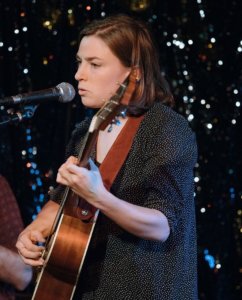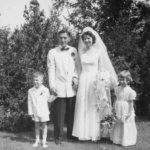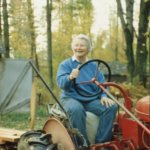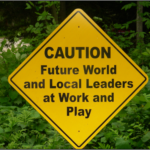Sing:
Hark the Vesper bell is pealing,
O’er the meadow soft and green.
Nearer now, and nearer stealing,
Soft it breaks upon my ear.
Jubilate, jubilate, jubilate, amen. Jubilate, jubilate, jubilate, amen.
First Thoughts: Well. This was quite a week for each of us and for all of us. News of camp’s closing is still provoking so many emotions. Don’t you find yourself responding to little things around your house that remind you of camp? Maybe it’s a line of a camp song that seems to have taken up residence in your head. Maybe it’s a fern in a woods or a park that you visit. Hopefully, it’s hearing from a friend whose relationship was born and strengthened at camp. It’s all so powerful and you know…the reminders help me find the strength to carry on with the future. This place and those reminders will be around for us again, you can count on it.
Today’s Vespers is a walk through the history of camps and of ours, too. Knowing that there’s a history to American camping is one of the best ways to see that camps have carried on through a number of historical challenges and always, always, come out on the other side in fine form. You can count on it.
Today’s Vespers also will be a call for each of us to consider, as Betsey Cox community members always do, the painful week we experienced as a country. Again, as always, we will think together about how we can contribute to the resolution of the significant challenges that have emerged sharply during this pandemic, but have really called for our attention for many years before that. The good news is….we can all help!
Sing: Three rounds. Teach them to those gathered with you today!
“DONA NOBIS PACEM Give us peace”
Dona, nobis pacem, pacem. Dona, nobis, pacem.
Dona, nobis pacem, Dona nobis, pacem.
Dona, nobis pacem. Dona nobis, pacem.
“WHAT A GOODLY THING”
What a goodly thing,
If the children of the earth
Could live together,
In peace.
“RISE UP, OH FLAME”
Rise up, oh flame,
By thy light glowing,
Show to us beauty, vision, and joy.
Some Camp Words: 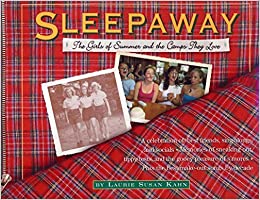
From “Sleepaway: The Girls of Summer and the Camps they Love”, By Laurie Susan Kahn
“We learned to play and work and love with an intensity that drew us out of ourselves, beyond ourselves, to dream and achieve more than we imagined possible.”
-Demi Lockett Prentis from Camp Mystic
“The whole year, no matter what went wrong, I knew everything would be okay once I got to camp.”
-Toby Boyer Freeman, Camp Mataponi
“The first day of my first summer at camp, I watched as other campers arrived, screaming gleefully as they spotted and reunited with friends. One group wrapped their arms around one another’s shoulders and broke into song; others just hugged and jumped up and down. At ten, I was stunned that girls who were not related could be that happy to see each other. Of course, for the next five summers I was one of those hugging, screaming, singing girls.”
-Robin Dobson, Camp Tegawitha
“I was five years old. I lived with my parents and baby sister in a bucolic Massachusetts town. Every day I’d ride my bicycle or walk to the beach some blocks away. Then, one hot day in June, my parents scheduled a car trip to New York to visit my grandparents. On day two of our visit, we got up early and drove to Grand Central Station, where my parents introduced me to a girl who I thought was at least my mother’s age, but who, in fact, was probably sixteen or seventeen. Her name was Roberta Levenson; they said she would be my train counselor. I knew what a train was, so I wasn’t afraid of that. But I didn’t know what a counselor was, and no one explained. And then my parents basically ran away. I couldn’t imagine what they were thinking. Maybe they thought I’d resist leaving them for the summer. They’d have been wrong.”
-Marcelle Harrison, Camp Kear-Sarge
Music with Old Friends: Music is one element of Camp Betsey Cox culture that we all treasure. Two long-time Betsey Cox people, Christie Belanger and Eliza Densmore, are making musical careers, writing, singing and producing their own songs and songs written by other musicians they admire. Christie and Eliza agreed to offer a song a piece for this Vespers. That’s because, at Betsey Cox, one favorite camp songs reminds us that
“But if there were no music,
I would not get through.”
Thank goodness for music, for Christie and Eliza’s gifts to us today, and for all the songs held in our hearts.
Christie will play “The Stuff of Us”, by Clem Snide and Eliza will play “Pure Imagination”, by Leslie Bricusse and Anthony Newley from the 1970 Willy Wonka film
Camp Quickie Quiz: 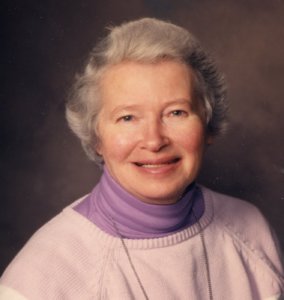 When Mrs. D. (Jean Davies, the founder of our camp) was director, once a week the evening program was a “quickie quiz”. We all would gather in the lodge to work independently on a page of camp questions, usually based on things that had happened around camp during that particular week. You could win the Quickie Quiz by getting almost all questions right, and the prize was something we all yearned after at camp (a small handful of M & Ms, a popsicle, those sorts of things.).
When Mrs. D. (Jean Davies, the founder of our camp) was director, once a week the evening program was a “quickie quiz”. We all would gather in the lodge to work independently on a page of camp questions, usually based on things that had happened around camp during that particular week. You could win the Quickie Quiz by getting almost all questions right, and the prize was something we all yearned after at camp (a small handful of M & Ms, a popsicle, those sorts of things.).
The last question on the Quickie Quiz, for many years, was something called the “Fizzie Fooler”. Only a few of us will remember that Fizzies were a kind of candy, about the size of a quarter, and when you put it on your tongue, it melted away in a delightful fizz of activity! The Fizzie Fooler was supposed to be a more obscure question and we all hoped we would be able to get it right and acquire the taste treat of the Fizzie.
Today we’ll resurrect the Quickie Quiz! And the Fizzie Fooler! Let’s see if you can get the answers! They will be at the end of this Vespers! Even though some of these questions are from early years of camp, if you think, and take yourself back to camp, you’ll figure them out!
- What happened to the first lodge that was built at Betsey Cox?
- How did campers get clean in the first ten or so years of camp, before the shower houses were built?
- What kinds of dancing were allowed at the socials for the first 20 or so years of camp?
- Where was weaving held during the first few years of camp?
- Why is spaghetti always served on social night?
- Why was “Bleak” called “Bleak”?
- What is the name of the BC Lodge?
- Why did Mrs. D. start camp?
- Which BC staff members also worked as Sangamon staff?
- What long-time BC camper/staff member has a family cabin on Burr Pond?
Fizzie Fooler: Where was the original tree house? Send answers to Lorrie who will try to find Fizzies to send back! [email protected]
Sing: “Hearth and Fire”, Gordon Bok
Hearth and fire be ours tonight, and all the dark outside.
Fair the night and kind on you, wherever you may bide.
And I’d be the sun upon your head, the wind about your face.
My love, upon the path you tread, and upon your wanderings, peace.
Song and love be ours tonight, and all the cold outside.
Peace and warmth be yours tonight, wherever you may bide.
And I’d be the sun upon your head, the wind about your face.
My love, upon the path you tread and upon your wanderings, peace.
Hearth and fire be ours tonight, and the wind in the birches tall,
O that the wind we hear tonight, will find you well and fair.
And I’d be the sun upon your head, the wind about your face.
My love, upon the path you tread and upon your wanderings, peace.
Thoughts: The first all-girls camp opened in Maine in 1902. Later that same year, Camp Kehonka in Wolfeboro, New Hampshire opened its cabin doors. Boys camps had been running since the mid 1800s, but when the director of Camp Kehonka welcomed “her” girls to camp and allowed them to run about the site in bloomers, the neighbors were scandalized! Imagine! There they were, in broad daylight, in their undies!
The first boys’ camps, way back then in the 1870s and 1880s, were all about parents’ beliefs that “roughing” it would build the kind of character boys would need in the increasingly competitive urban, industrialized world. One early boys’ camp director warned that humanity would “die of indoorness” if boys didn’t get out into the wilderness. (These days most of us know exactly how that feels!)
But girls? Well….in that same time period, girls growing up in wealthy families were all about learning the life of a Victorian woman. Yes…there were corsets, cumbersome gowns to be worn, lavish hair styles to create, preserve and protect! Certainly those girls would Not benefit from a rustic experience in the outdoors. Their roles as “decorative objects” in American elite families was indoors and prescribed! At the same time, lower class girls (and boys) were too often at work in the factories of the time and would never have imagined time at a summer camp in the woods.
And then….in the early 1900s, girls got a break! Cities became increasingly unpleasant, and retreats in the country became more popular. Those of you who have visited Newport, Rhode Island’s “summer cottages” for the wealthy, know about the grounds on which these American “castles” sat. Girls began to play croquet, to sail a bit, and slowly, fashion changed and so did the culture about how girls could relate to the outdoors.
Within the first ten years of the new century, thousands of girls, mostly from the upper classes, were sent to camp to become physical stronger, healthier, and often, to cultivate their artistic skills. But that was only the beginning!
Here’s what Laurie Susan Kahn explains in her book about sleepaway camps and their development:
“These early camps were laboratories for a passionate group of men and women, mostly educators in the North-east, who envisioned that a love of nature and simplicity, as well as the values of loyalty, integrity, and respect, would be more easily inculcated in a beautiful environment where time was marked by sparkling mornings and lovelier sunsets. Determined to make their dreams real, these camp pioneers looked at first to the mountains and lakes of New England and the Adirondacks….Before long, however, other camp leaders were turning their vision south and west so that children everywhere could experience the magic that was camp.”
Camp caught on! In the early 1920s, Sangamon’s founders, Leone and Eleanor Smith, moved north to Vermont from their Massachusetts roots. Leone had been hired to start a boys’ club in the little town of Pittsford. Apparently the Pittsford boys had been too aimless and need a rigorous focus to get them moving! Leone began the boys’ club, and on one of the group’s outings, came across the old farmstead that would become Camp Sangamon. 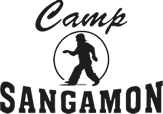 The land and farmhouse were purchased, and within a very short period of time, there were boys on site helping to build the cabins, helping to repurpose the farmhouse into a lodge, helping to put some kind of a dock into Burr Pond for regular swims.
The land and farmhouse were purchased, and within a very short period of time, there were boys on site helping to build the cabins, helping to repurpose the farmhouse into a lodge, helping to put some kind of a dock into Burr Pond for regular swims.
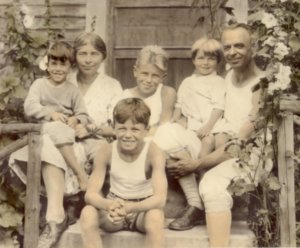 Leone and Eleanor had four children, three boys and Jean, their only daughter. Eleanor had very strong feelings, we have learned, about girls being around the camp boys. So when Jean grew into the double-digit ages, she was sent off to the emerging girls camps in Vermont. You won’t be surprised to learn that she was not entranced with the more structured, less rustic girls camps that she was sent off to. She did not return to most of them, and from those early years, she birthed a plan to start her own girls’ camp that would be based on the simple, rustic life that the boys at Camp Sangamon enjoyed.
Leone and Eleanor had four children, three boys and Jean, their only daughter. Eleanor had very strong feelings, we have learned, about girls being around the camp boys. So when Jean grew into the double-digit ages, she was sent off to the emerging girls camps in Vermont. You won’t be surprised to learn that she was not entranced with the more structured, less rustic girls camps that she was sent off to. She did not return to most of them, and from those early years, she birthed a plan to start her own girls’ camp that would be based on the simple, rustic life that the boys at Camp Sangamon enjoyed.
And that’s how it happened! When Jean married Charles Davies, the wedding present the two of them received from Leone and Eleanor were the 60 acres of Sangamon land that Camp Betsey Cox now sits upon, and the old red tractor that still moves trunks around on opening and closing days! Leone and Eleanor were not convinced that a girls’ camp would be successful. In fact they were pretty sure it would not be. And just look what has happened!
Sixty four years later, both Sangamon AND Betsey Cox are going strong! The values that Mrs. D. held about what was good for girls—independence, freedom to find and follow one’s own goals, healthy living in the outdoors, sustainable simple living—all of that has carried on over the decades and will continue to offer girls the chance to become their very best selves. For that, aren’t we all so very grateful!
Sing: “Oh When a BC Girl” 
Oh when a BC girl walks down the street..
She’s got that hundred per from head to feet.
She’s got that smile, that style, that winning way.
No matter where she goes you’ll recognize and say
Now that’s a girl I’d like to know
She’s got that good old-fashioned pep and sway.
And when you look at her you’ll stop and say, stop and say,
She’s a BC girl, a BC girl!
More Thoughts: And now, because we are Betsey Cox community members who believe in social justice, equity, and a global world, we must take time to think about the events this week in our own country following on the murder of a black man by police in Minneapolis, Minnesota. This death was not only an individual tragedy, but it was a tipping point in our country. Too many people of color, especially African American men and boys have been killed in police oversteps. Too many people of color and poor Americans have not had the opportunities any person in our country deserves—a good education, a safe home, a future based on dreams that can be realized through a little work and support. The outrage in our country’s cities reflects that too many Americans are outside these opportunities and we must name the problem and get about the business of solving it.
In the history of Camp Betsey Cox, in the early 70s, Ilyasah and Gamilah Shabazz arrived at Camp Betsey Cox. These sisters were the daughters of recently slain civil-rights activist, Malcolm X. It was such an honor to have our camp’s reputation as a values-rich summer camp be the reason for Betty Shabazz to send her girls to us. The Shabazz girls came to camp for a number of summers and they brought a number of their close friends with them over the years. They were fun-loving, great kids, as are all Betsey Cox girls, of course!
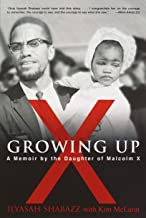 Years later, Ilyasah wrote a book called “GROWING UP X” about her life with and without her father. There is an entire chapter in the book called “Camp Betsey Cox”. Her words confirm what we all know….that our camp is a safe place for all sorts of people. That we know how to look for and celebrate the differences in each person who shows up. That we value each person that shows up! And that we care to spread that knowledge and behavior out into the world when camp is over.
Years later, Ilyasah wrote a book called “GROWING UP X” about her life with and without her father. There is an entire chapter in the book called “Camp Betsey Cox”. Her words confirm what we all know….that our camp is a safe place for all sorts of people. That we know how to look for and celebrate the differences in each person who shows up. That we value each person that shows up! And that we care to spread that knowledge and behavior out into the world when camp is over.
Yasah writes:
“in all my years at Camp Betsey Cox, I felt nothing but warmth and respect from the counselors and staff…Camp Betsey Cox is built on the site of an old hill farm near Pittsford, Vermont. Surrounded by the Green Mountains, the property spans acres and acres of lush green meadowland and cool, dark pine-needled woods. There are tennis courts; grooming stables and horseback riding paths’ a huge vegetable patch; and a spring-fed lake.”
We are a very special place, as Yasah describes. But it is not enough for us to simply celebrate that truth. We must bring our ability to be warm and respectful out into the broader world. The last paragraphs of Yasah’s book includes the following sentences:
“None of us has to live a life of bitterness. None of us has to live a life of despair….We all have the capacity to make the world a better place if we only stand up and demand that it be so. If we only challenge injustice and oppression in every shape and form. ….Life is not a destination; it is a journey….In order to succeed in life, we must first believe that we can.”
Yes. Camp is closed for 2020. But all of our alumni, current campers, staff and camp family broadly defined, are out and about in the world this summer. May we all live with the purpose to return to camp with stories of doing good and important things for others and ourselves. May we provide wisdom and help as we can. May we spread the values we know and have lived at camp to the summer months that lie ahead.
Sing: “Forever Strong” by Bob Dylan-song edited for camp.
May God bless and keep you always.
May your wishes all come true.
May you always do for others,
And let others do for you.
May you climb the ladder to the stars
And stand on every rung.
May you be…
Forever Strong.
Chorus:
Forever Strong, Forever Strong.
May you be…Forever Strong.
May you grow up to be righteous.
May you grow up to be true.
May you always know the truth
And see the light surrounding you.
May you always be courageous
Stand upright and be strong.
May you be…forever strong.
Chorus:
Forever Strong, Forever Strong.
May you be…Forever Strong.
May your hands always be busy.
May your feet always be swift.
May you have a strong foundation,
When the winds of changes shift.
May your heart always be joyful.
May your song always be sung.
May you be…Forever Strong.
Chorus:
Forever Strong, Forever Strong.
May you be…Forever Strong.
Final Thought:
“I was afflicted with the opposite of homesickness; I had a serious case of ‘camp sickness’. The day I came home, I’d make a calendar marking the days till the next summer….Strangely enough, I don’t remember what I liked best about camp. Maybe everything. It was total acceptance, an environment where I could learn, explore, and be noticed for my achievements…From my perspective, I am who I am because of having gone to camp.”
-Holly Louise Carlisle, Camp Kineowatha
Silence
Jubilate, jubilate, jubilate, amen. Jubilate, jubilate, jubilate, amen.
Answers to the Quickie Quiz:
- The lodge collapsed under heavy spring snow.
- Everyone washed in the pond. NOT a good idea environmentally!
- Only square dancing.
- The Farmhouse
- Mrs. D. thought having the girls eat garlic before the socials was a good idea. That’s the myth, at least!
- Bleak staff had to sit all by themselves.
- The Jean S. Davies Lodge
- To make a girls’ camp on the Sangamon model
- Elaine, Marcy and Kim
- Lizzy Woolf


